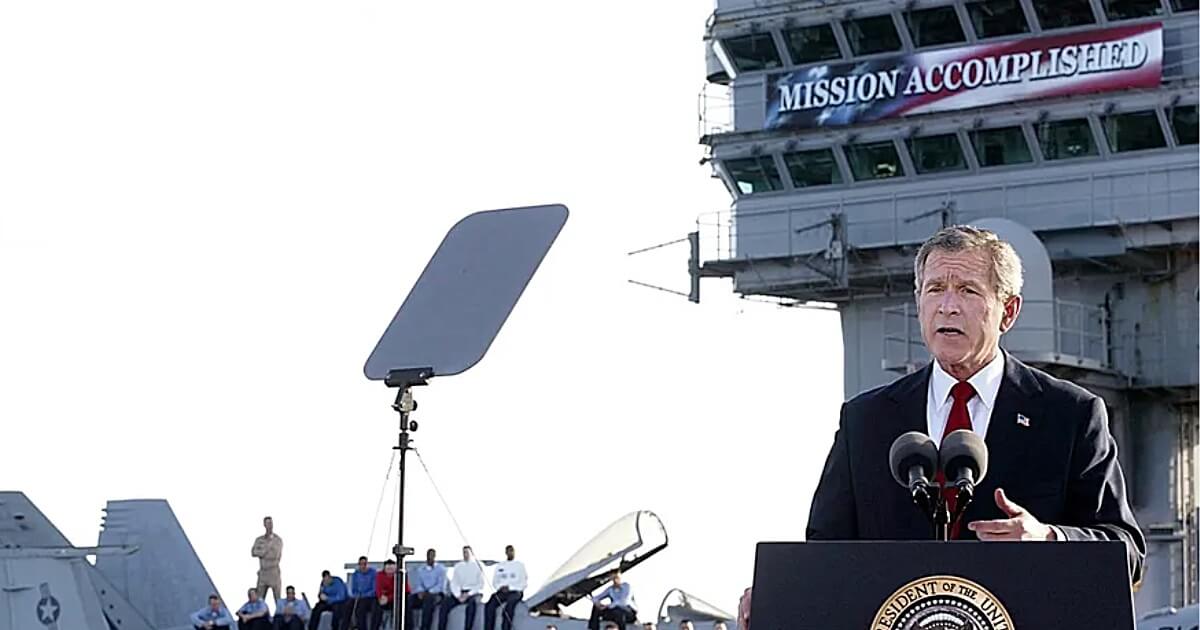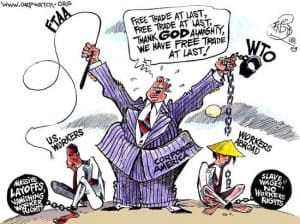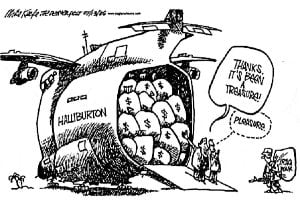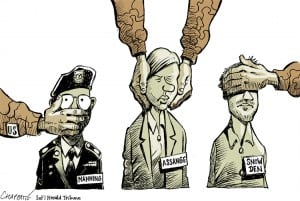Promising “democracy, development, free markets, and free trade” to the world in the wake of 9/11, the U.S. administration unwittingly made the case that market fundamentalism contradicts democracy.
| This post belongs to a reading series of Democracy Incorporated by Sheldon S. Wolin. For quick access to all chapters, please click here. Disclaimer: This chapter summary is personal work and an invitation to read the book itself for a detailed view of all the author’s ideas. |
To Sheldon Wolin, The National Security Strategy of the United States of September 9, 2002 (hereafter NSS)1 represented “the clearest formulation of the administration’s understanding of the mission of Superpower and of its totalizing reach.” There is no doubt that in the minds of its authors, this totalizing reach only expressed the positive outcome of a new era, where “democracy, development, free markets, and free trade” would be the conjuring forces toward a brighter and safer future. The shady notion of “free markets” appears as the core solution to all of humanity’s ailments.
A common misconception about utopian thinking is to consider that it is disconnected from the trivialities of power. Though some utopists will acknowledge that what they describe is fantasy and only meant to serve as a source of inspiration, others consider their creation a genuine project. To them, the univocity of their solution is the precise reason why no one could reasonably object to its realization. If there is a unified formula for collective happiness ever after, why dispense the world from its implementation?
Sheldon Wolin explains: “There have been three recurrent elements or prerequisites in many visions of utopia. One is that the founders of utopia possess some form of knowledge, some unquestionable truth, concerning what the right order of society should be, what should be the proper arrangement of its major institutions. The second element is that utopians must imagine it possible to possess the powers capable of establishing and realizing the utopian order. The third element is the opportunity of bringing utopia into existence and the skill in seizing and exploiting that moment. The NSS document embodies the first element, the blueprint, and suggests the second, the powers that seem to put utopia within reach. The third element, opportunity, was concocted in the preemptive war against Iraq.”
Regarding what the right order of society should be, the NSS states that “The great struggles of the twentieth century between liberty and totalitarianism ended with a decisive victory for the forces of freedom—and a single sustainable model for national success: freedom, democracy, and free enterprise.”2 Confident in this good omen from history, the United States “will actively work to bring the hope of democracy, development, free markets, and free trade to every corner of the world.”3 And as “Poverty, weak institutions, and corruption can make weak states vulnerable to terrorist networks and drug cartels within their borders,”4, the solution is in the fact that “Free trade and free markets have proven their ability to lift whole societies out of poverty”5 In other words, instead of specifying how to foster democracy from within, the NSS makes “free trade” the single virtue of sound politics.
As Sheldon Wolin points out, however, in the real world “Free trade and free markets in the hands of the already powerful are not symmetrical with free trade and markets in the hands of ‘weak’ societies. Instead, the effect upon the poor nations of opting for them invariably turns simple weakness into dependence on those nations whose economies have made them dominant powers and who, accordingly, have the right to declare a state weak and call its performance to account.” Accordingly, when the NSS makes the overly general statement that “market economies, not command-and-control economies with the heavy hand of government, are the best way to promote prosperity and reduce poverty,”6 it is under the logical assumption that this cannot happen in a vacuum: “For freedom to thrive, accountability must be expected and required.”7
Sheldon Wolin logically concludes that in this skewed perspective “freedom is granted conditionally and performance is accountable to the power that makes freedom possible. What began as the challenge posed by terrorism becomes conflated into ‘a great mission’ that comprehends virtually all of the world’s ills and, in the process, inflates national power into global power.” The accountability the NSS refers to is not that of political representatives toward their constituents but of all countries toward the United States—the “free trade” grand scheduler.
“Free trade” is the NSS utopia that sees in foreign terrorism its opportunity to bind together market fundamentalism and political power into a form of Superpower. As the author explains, “Light-handed government in regard to economic policy—a conception that might be termed ‘antipolitical economy’—and heavy-handed state power to fight terrorism: the two represent a unique power combination. In the economies of contemporary capitalist societies relationships reek of unequal power, but dominant powers differ from those of the government or state.” Unchallenged military power coincides with increased economic and domestic powers. Not the power of the government—or the people for that matter. The unbound power of corporations. A superpower under the aegis of the United States.
***
As for the second element of the NSS “free trade” utopia—the powers capable of establishing and realizing the utopian order—, the same basic principle that the economy supersedes the political applies. This is why the economy is also designated in the NSS as the objective basis of national security: “Ultimately, the foundation of American strength is at home. It is in the skills of our people, the dynamism of our economy, and the resilience of our institutions. A diverse, modern society has inherent, ambitious, entrepreneurial energy. Our strength comes from what we do with that energy. That is where our national security begins.”8
The economy, in this perspective, is more than a system providing goods and services; “it is a system of power, says Sheldon Wolin, that deserves to be considered as much a part of the ‘foundation’ of political society as the institutions prescribed by the Constitution.” In the trinity of “freedom, democracy, and free enterprise,” the author continues, freedom and democracy are “clearly subservient to free enterprise, a relationship that, by providing ‘cover’ for the political incorporation of the corporation, assumes great significance in light of the fact that the economic structures defining free enterprise are inherently autocratic, hierarchical, and primed for expansion.”
It is no secret that the United States has tried more times than probably all other countries combined to overthrow foreign governments in the course of its history.9 Since after WWII, this has become its trademark. “Free trade” and “free markets” have exposed, as Sheldon Wolin reminds us, “weaker, less economically developed societies to the highly advanced forms of economic power wielded by corporations and tacitly backed by American political and military power.”
This political, economic, and military predominance could be seen in a different light if the U.S. were an ally among other allies in the global war against terrorism, but it only has vassals. As per the NSS, “While the United States will constantly strive to enlist the support of the international community, we will not hesitate to act alone, if necessary, to exercise our right of self-defense by acting preemptively against such terrorists, to prevent them from doing harm against our people and our country. . . . The greater the threat, the greater is the risk of inaction—and the more compelling the case for taking anticipatory action to defend ourselves, even if uncertainty remains as to the time and place of the enemy’s attack. . . . We will be prepared to act apart (from friends and partners) when our interests and unique responsibilities require.”10 What others think or say in a matter where their interests are at stake too is deemed irrelevant. To make things definitely clear, if U.S. officials or agents were accused of committing criminal acts, they “are not [to be] impaired by the potential for investigations, inquiry, or prosecution by the International Criminal Court whose jurisdiction does not extend to Americans and which we do not accept.”11 International peace with the international community kept at bay; talk of American Exceptionalism…
This stance against the right of other nations to know the truth and find justice is conveyed at home with the expansion of executive powers. The war on terrorism, says Sheldon Wolin, with its accompanying emphasis upon “homeland security,” presumes that state power, now inflated by doctrines of preemptive war and released from treaty obligations and the potential constraints of international judicial bodies, can turn inwards, confident that in its domestic pursuit of terrorists the powers it claimed, like the powers it had projected abroad, would be measured, not by ordinary constitutional standards, but by the shadowy and ubiquitous character of terrorism as officially defined.
***
The third element of the war on terror utopian new world order—its opportunity—was Iraq. And the outcome is plain to see: Superpower failed. “Instead of achieving conquest, continues the author, it provoked an insurgency that left Iraq virtually ungovernable and close to being uninhabitable; instead of dealing terrorism a damaging blow, it exacerbated the problem and multiplied the ranks of the enemy; instead of seeing the world cowering before its might, Superpower faced a world where many governments and their peoples found common ground in opposing the United States. In Iraq Superpower succeeded only in providing the answer to the plaintive question of 9/11, ‘Why do they hate us?'”
This failure proves that the neoconservative ideology expressed in the NSS is no more than an intellectual veneer, chiefly motivated by the age-old lust for power: “The shabby and unverifiable arguments, especially those before the UN, were unconvincing precisely because everyone was aware that Superpower had long since made up its mind. . . . Superpower’s operatives no more needed the consent of the UN than they needed an accurate counting of ballots in the presidential election of 2000.” In essence, the U.S. administration’s new world order utopia is a political coup: all of a sudden much becomes possible. This is all there is to it. Whistleblowers, be damned!
The NSS and the decisions surrounding its publication are not without reminding how Vladimir Ilyich Ulyanov, alias Lenin, conceived political power: the main thing is to seize it. To the communist leader, the real enemy of the revolution was not the crumbling reign of the Russian czar but parliamentary debates for the common good. The aspiration for social justice through the establishment of democratic institutions contradicted Marx’s assumption of “dialectic materialism” driving the whole march of history. The idea of peacefully resolving social conflicts was antithetical to the dogma of class struggle, as it is to “free trade” seen as the single key to all forms of progress.
Like Vladimir Ilyich Ulyanov, neocons and neoliberals believe that power obeys a law that has nothing to do with the will of the people; they only differ with him on the utopia itself. Once George W. Bush was crowned in 2000 after political and constitutional legitimacy were cynically discarded, “class-based tax cuts, the undermining of decades of environmental safeguards, the crude collusion with corporate power, the decimation of social programs benefiting the poor, the steady dismantling of the ‘wall’ separating church and state, the nomination of highly ideological candidates for judicial appointment” could all run amock. What was initially needed for power brokers during the 2000 presidential election was only to realize that, if sufficiently determined, they could overcome the inhibitions of democratic constitutionalism. All in the name of “free markets,” a cheap ideological pendant to the long-deceased communist utopia.
Share your thoughts below. Follow a gradual path with a Study Group.
Footnotes
- The document is accessible online at: https://nssarchive.us/wp-content/uploads/2020/04/2002.pdf
- NSS, Introduction, p.1.
- Ibid., p.2.
- Ibid., p. 3.
- Ibid.
- Ibid, VI, p. 17.
- Ibid., p. 4.
- Ibid., sec. 9, p. 24
- See William Blum, Killing Hope: Us Military and CIA Interventions Since World War II and Overthrowing other people’s governments: The Master List. For a quick reminder, see also the Washington Post article by Lindsey A. O’Rourke from December 23, 2016: The U.S. tried to change other countries’ governments 72 times during the Cold War.
- Ibid. p. 6
- Ibid., sec. 9, p. 23.



